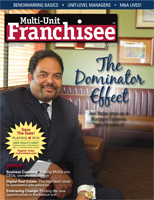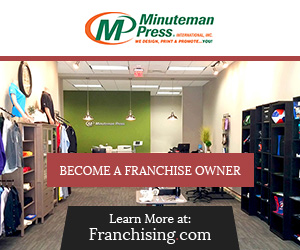When you have only one location, it's pretty easy to work both in your business as well as on it.
When you have two locations, most often it's still doable--you can manage it. Almost without exception, however, when you get to three or more locations, you'll find yourself stretched way past your limits. You will be so busy working in your business that you won't have any time to work on it, and that's a recipe for disaster. When the disasters start piling up, it's past time to recruit the unit-level managers (ULMs) you need to keep things running smoothly and help you grow your business.
It's critically important to hire the right people to fill these slots because recent research has shown that, more than other single factor, the quality of the ULM directly affects the ROI of the unit. Unfortunately, it seems not many franchisees are having a lot of luck recruiting and hiring the right ULMs, because it's been reported that more than 50 percent of all new managers fail within the first 18 months on the job.
If you've been trying to fill any ULM slots lately, you know all too well it's a negative unemployment situation out there. The situation is exacerbated by the fact that the proven principle of talent migration is often always missed at the ULM level. Great managers switch industries with ease. Skills and operations are teachable. Great managers know how to hire, lead, motivate, and get results--and they can do it anywhere.
In a comprehensive study by Franklin Covey for Coca-Cola, it was discovered that the highest-achieving ULMs have three key traits in common:
- Not only do they produce financial results, they actually overachieve relative to market potential.
- They generate intense customer loyalty.
- They inspire strong employee commitment and engagement.
(For a copy of the study, "Getting to Great: Mapping Management Practices that Drive Store Performance," email [email protected].)
Charles Smithgall opened his first SEI/Aaron's furniture store in 1995 and is the chair and CEO of today's 70-store enterprise. Smithgall says, "Our general managers are the complete key to our success and we've found the great ones come in all shapes, sizes, ethnicities, and sexes." Smithgall goes on, "I've learned from experience that certain things can't be taught. Maybe we can bring it out, but the basics have to be hardwired." He now hones in on these key qualities and attributes:
- Stamina/energy
- Intelligence and common sense
- Enjoys and is interested in working with all kinds of people
- Communication skills
- Honesty, results/goal-oriented
- Passion
- Conflict resolution and diplomacy skills
Since Smithgall is enjoying tremendous success--even though he does not require industry experience or a college degree--you might want to ask yourself: "Am I limiting my recruiting pool by making industry experience and/or higher education a requirement?"
Before you spend any money on recruiting though, you need to come up with at least five compelling reasons (other than "for the money") why people who already have good jobs would want to work for your organization and/or why your talented unit-level employees would want the promotion.
Keep in mind that money motivates people to get jobs, but not necessarily to stick with them. What do you offer besides a paycheck? A national study found that managers, across generations, want these four things:
- Supportive bosses and co-workers
- Interesting work
- Growth opportunities
- Work/life balance
How does your organization meet these universal needs? What's on your list of compelling reasons people should want to work for you?
Gloria and Rick Plaisted are seasoned co-entrepreneurs who have spent more than 30 years buying, restoring, and developing Dairy Queens as a family team. To date, they have taken all acquisition stores to a 100 percent success rate, turning under-performing stores into profitable entities.
When asked how they do it, Gloria says: "Over the years, we've built a reputation as being a great place to work. We do very little recruitment advertising. Most of our new hires come from employee referrals and 90 percent of our ULMs came up through the organization. Most joined us when they were just 16 or 17 years old, and all have what we call a 'profit mindset,' not a 'payroll mindset.' Once we identify good candidates, we grow them into ULMs by a well-structured training process that continually challenges them. Our goal is to develop leaders in the QSR industry. Most important, we lead by example."
Once you know exactly what you're looking for and why that person should be eager to come on board, there are only two sources of recruits for any job opening. You can promote from within or recruit them from somewhere else.
If you promote from within, give these people the training they need to do the job and the support they need to keep growing. One way is through a hands-on, personalized support and development program.
If you're going to recruit from the outside world, make sure the people you bring in are better than the ones you already have. Here are some ideas about where to look to find the people you need:
- Beyond just your direct competition. Attitudes, skills, and achievements are far more important to ULM success than industry-specific experience.
- Contact the managers who have left your company whom you would like to see come back. (The worst they can say is, "No.")
- When you call to check a new hire's references, ask the ULMs you contact how they like their jobs, and if they might be interested in a new opportunity.
- Ask your present employees about the managers they had on previous jobs.
- Check out local community colleges. Managers take a lot of courses. Send your managers to a class or two and ask them to be on the lookout for candidates.
- Go after companies that are not doing well, merging, or experiencing lots of change. (When you learned Bennigan's is folding, no matter what your industry, you got right on the phone to line up meetings with their local ULMs... didn't you?)
So, what's the shortest distance between where you are now and your ROI goals? Without question, it all depends on your ULMs.
Mel Kleiman, CSP, is an internationally recognized consultant, author, and speaker on strategies for hiring and retaining the best front-line employees. He is president of Humetrics, a leading developer of systems, training, processes, and tools for recruitment, selection, and retention of the hourly workforce. He is the author of five books, including the best-selling Hire Tough, Manage Easy. Find him at (713) 771-4401, [email protected], or at www.kleimanhr.com.
Share this Feature
Recommended Reading:
FRANCHISE TOPICS
- Multi-Unit Franchising
- Get Started in Franchising
- Franchise Growth
- Franchise Operations
- Open New Units
- Franchise Leadership
- Franchise Marketing
- Technology
- Franchise Law
- Franchise Awards
- Franchise Rankings
- Franchise Trends
- Franchise Development
- Featured Franchise Stories
FEATURED IN

Multi-Unit Franchisee Magazine: Issue 4, 2008

$400,000





 The multi-unit franchise opportunities listed above are not related to or endorsed by Multi-Unit Franchisee or Franchise Update Media Group. We are not engaged in, supporting, or endorsing any specific franchise, business opportunity, company or individual. No statement in this site is to be construed as a recommendation. We encourage prospective franchise buyers to perform extensive due diligence when considering a franchise opportunity.
The multi-unit franchise opportunities listed above are not related to or endorsed by Multi-Unit Franchisee or Franchise Update Media Group. We are not engaged in, supporting, or endorsing any specific franchise, business opportunity, company or individual. No statement in this site is to be construed as a recommendation. We encourage prospective franchise buyers to perform extensive due diligence when considering a franchise opportunity.